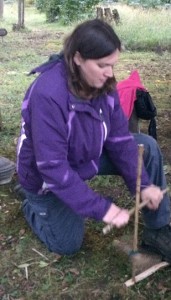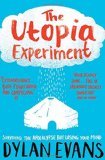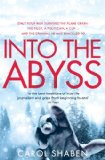Five words from the blurb: collapse, civilization, Scottish, community, depressed
I love reading books about the collapse of civilisation* (strange aren’t I?!) and frequently wonder whether I should move to the country and become self-sufficient in preparation for the breakdown of society. So, when I came across this book about a man who decided to practise post-apocalyptic life, I snapped it up.
Dylan Evans thought that society had a high probability of collapse so decided to set up a community in a remote Scottish valley. He quit his job, advertised for volunteers on-line, and began building things from scratch, in order to practise the skills required to survive. This book explains the reasonings behind his decisions and how his thoughts darkened as the experiment progressed. His eventual decline into mental illness was skilfully written and enabled the reader to understand how the gradual encroachment of dark thoughts can lead to mental collapse.
The book was engaging throughout. It was fast-paced and entertaining, but also able to handle serious issues with sensitivity. I admired the honesty of the writing and the way it gave an accurate account of how difficult life without simple things can be:
It’s the little things like toilet paper and toothpaste and soap, things that you hardly notice when you go about your daily life in rich countries, that you don’t think about when you merly imagine what life might be like after the collapse of civilization. It’s only when you start acting it out – when you start trying to live as if civilization has already collapsed – that these little details intrude. And these details turn out to matter much more than you might think.
I also loved the way it mentioned many other books and films that deal with post-apocalyptic/wilderness living as I am always keen to learn more basic survival skills (as you can see from the photo of me below!) – you’ll probably see a few of these titles reviewed on this blog in the near future.

Overall, this was an entertaining read that has only fuelled my desire to learn more about life without modern luxuries.

*Blindness by José Saramago, The Death of Grass by John Christopher and The Road by Cormac McCarthy are my favourites
What are your favourite books on post-apocalyptic/wilderness living?




